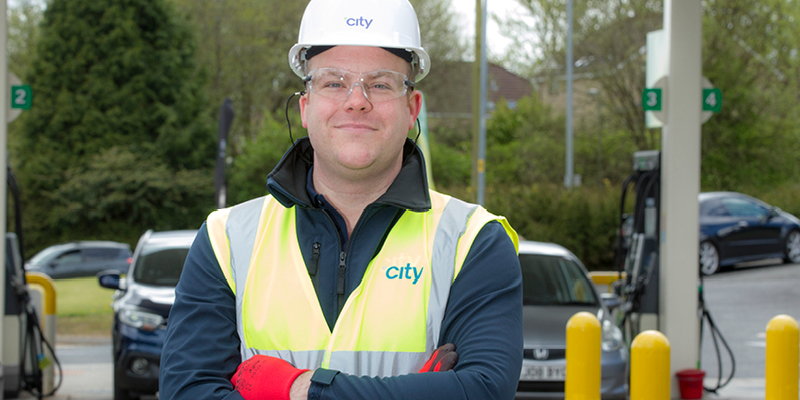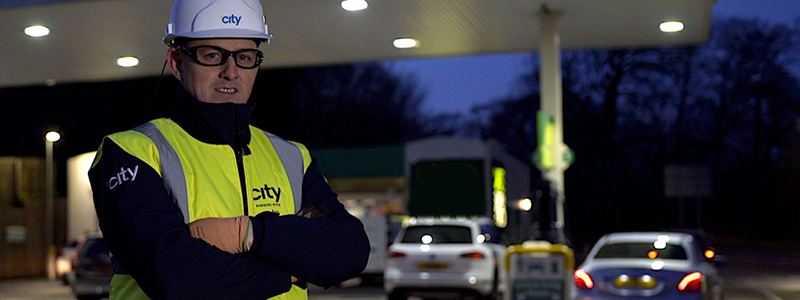Petrol Forecourt Case study
Fuelling the nation’s people and vehicles since 2011
Managing and maintaining facilities at 318 forecourts for a national oil and gas company


Our dedicated Service Desk processes reactive and planned tasks by managing call allocation to three different City teams:
Electrical
This team focus on compliance-based planned preventative maintenance to keep sites running smoothly and safely to the relevant statutory standards. This includes testing fire alarms and emergency lighting, and conducting PAT tests (portable appliance testing). To conduct high-level repairs safely, our fleet includes a vehicle mounted MEWP (mobile elevating work platform), with the platform operator working alongside the regional electrical technician assigned to the job. The team also deal with all electrical reactive calls that occur, such as replacement light fittings or damage to electrical fixtures.
Refrigeration
A multi-skilled team maintain both the HVAC systems and refrigeration equipment required to operate this company’s partnership with a popular food retailer. A sub-team work in conjunction with the main team to deep clean every site’s refrigeration cases on a periodic basis, on an agreed annual schedule. Our team work overnight to minimise disruption to customers.
Fabric
Our team of small works builders maintain the forecourts’ building fabric. We cover a wide range of fabric repair and replacement such as internal doors, door furniture and hardware, plumbing and sanitary ware in site toilet and food production areas. The team will deal with any flooring, wall and ceiling repairs and many other building fabric issues. A roof gutter cleaning schedule is carried out using a ground operated high reach vacuum and camera system.
We also manage sub-contract partners for landscaping, roller shutter doors, forecourt cleaning, subsurface drainage, plus other services required at specific sites in our partner’s portfolio.
We’ve upskilled our teams and equipped City technicians to look at jobs first. Our team can fix mechanical issues, avoiding the need for a sub-contractor to attend many types of fault
Protecting people from unique hazards
As a Safety Pass Alliance-accredited trainer for the Safety Passport Petrol Retail course, we protect our in-house and sub-contract teams against potential forecourt hazards. Running the course ourselves ensures completion by all parties.
Upskilling and innovation to realise efficiencies
We’ve upskilled our teams, equipping City technicians to look at jobs first. Our team can fix mechanical issues, avoiding the need for a sub-contractor to attend many types of fault. If a sub-contractor does need to attend, the attending technician can triage the job and give a detailed brief, increasing the chance of the sub-contractor resolving the issue on their first visit. This approach has generated significant value over the contract so far.
The fabric team complete projects previously sub-contracted to third parties, such as pest proofing remedial works. City’s headcount model means the labour is already accounted for, making this type of work much less expensive than the pest control sub-contractor’s quoted price.

Making an essential service as safe as possible
This company has traded throughout lockdown periods. To minimise contact between technicians and site-based teams, we created new remote sign-in and verification processes that avoided using iPads on site. These processes are ongoing to provide protection.
Early in the pandemic, for instances when we couldn’t enforce social distancing while working, we asked staff to shut the kiosk and trade through the night pay window.
Adding social value
Following on from the success of the fabric works team, we extended this to create a Planned Works function. These two-man teams complete heavier duty civil works issues on site. Jobs such as concrete and asphalt resurfacing, lamp post and street furniture replacement, manhole cover and linear drainage replacement channels are all covered by this team at a much reduced cost to the customer compared to bringing in a sub-contractor.
The Service Desk teams use both City’s CAFM system (Mercury) and the partner’s own system. An API integrates the systems in real-time, meaning the team can quickly and easily assign jobs, check status and chase open jobs. This minimises asset downtime and the potential for lost sales
We keep 640 forecourts compliant and running smoothly across our customer portfolio. Find out more about our dedicated forecourt solutions.